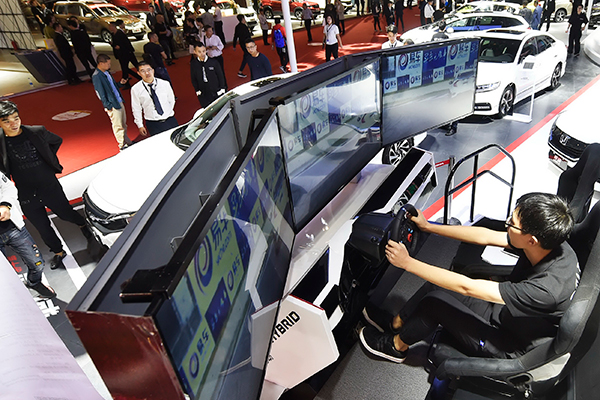Self-driving tech to give nation cutting edge


Burgeoning self-driving technologies are expected to give China an edge in advanced driver assistance systems, algorithms and software, analysts said.
ADAS-which mainly include radar, cameras and ultrasonic sensors to enhance safe driving-currently has a relatively low rate of market penetration in China.
"The rate in China is between 3 and 6 percent, while that in the United States or Europe is about 8 to 12 percent," according to Zheng Fangdan, a senior consultant at Chinese research firm CCID Consulting Co.
Thanks to the driverless-car push, the country's ADAS market is estimated to grow to 87.7 billion yuan ($13.5 billion) in 2020 from 11.7 billion yuan in 2015, she said at a recent seminar.
The uptrend in China corresponds with estimated global figures.
According to a Goldman Sachs report, the market for advanced driver-assistance systems and autonomous vehicles is estimated to grow from $3 billion in 2015 to $96 billion in 2025 and $290 billion in 2035.
Algorithms and software, the "key building blocks" in delivering autonomous cars, will see substantial growth in the future, Zheng said.
Yu Jie, co-CEO of Beijing-based JointWyse Automotive Co, agreed. He said: "We predict further strides in software capabilities for interpreting visual and other inputs driven by sensors to make fully autonomous driving a reality."
Demand for sensors, networking and other elements vital to autonomous driving would also be created, he added.
Their comments came as China has been working to clarify the legal landscape for autonomous vehicles, which are on a fast ramp to commercial availability.
Last month, the nation's first guideline on road tests of autonomous motor vehicles was released by local authorities in Beijing.
Later, the Ministry of Transport said that it would conduct research prior to issuing policies this year on autonomous technologies.
The government might issue the first nationwide license plate for testing driverless cars this June, Zhu Xichan, a professor from the School of Automotive Studies of Tongji University, said at the World Autonomous Vehicle Ecosystem Conference held in November.
Though the promise of autonomous cars is exciting, "innovation comes with risks", said the report from Goldman Sachs.
"Turning control over to software could lead to new hacking vulnerabilities and other hazards-liability issues that companies can't ignore. Cars that allow drivers to intervene in emergencies is a more likely scenario," the investment bank said.
Companies will likely focus on fine-tuning partial automation over the next few years, to overcome software challenges facing self-driving vehicles, it said.



































